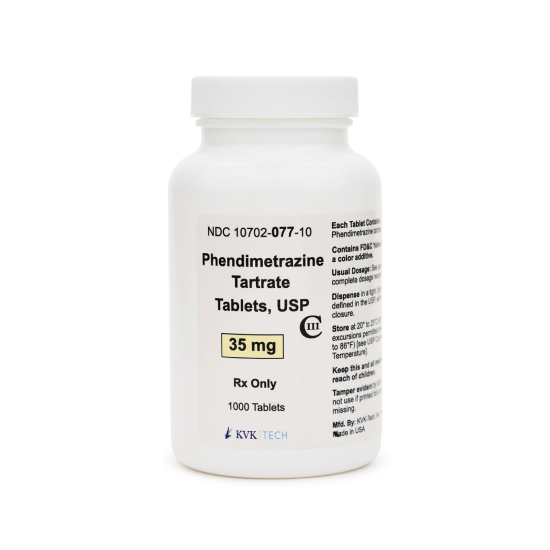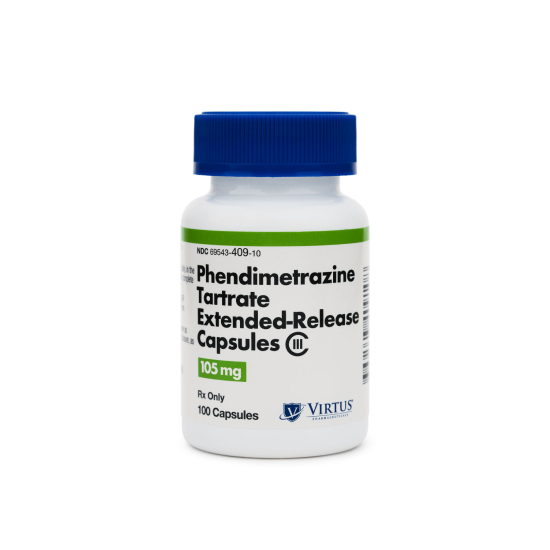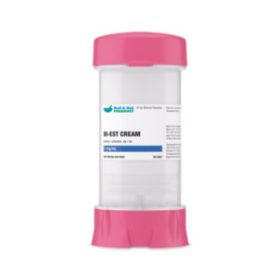This product is available solely through our 503A Compounding Pharmacy, ensuring personalized care and precision in every order. Please note that a valid prescription is required for purchase. If you do not have an account, please contact us.
Phendimetrazine Tartrate Tablet (Each) †
Phendimetrazine Tartrate Tablet (Extended Release) (Each) †
† commercial product
Phendimetrazine Tartrate Tablets are prescribed as a short-term treatment to assist in weight management. It is typically used along with a reduced-calorie diet, exercise, and behavioral modifications. The medication is classified as an appetite suppressant and is often prescribed for individuals struggling with obesity or weight-related health issues. It is intended for temporary use under medical supervision and helps support a structured weight-loss program.
Phendimetrazine works by affecting the central nervous system, particularly areas of the brain responsible for appetite control. It stimulates the release of norepinephrine, which helps decrease hunger signals and reduce food intake. By altering neurotransmitter activity, it promotes feelings of fullness and reduces the desire to eat. Additionally, it can increase metabolic rate and energy expenditure, which further assists in achieving weight loss when combined with lifestyle changes.
This medication is not recommended for individuals with a history of heart disease, uncontrolled high blood pressure, hyperthyroidism, glaucoma, or substance abuse. It should also be avoided in those currently using monoamine oxidase inhibitors (MAOIs) or within 14 days of stopping them. Caution is advised when prescribing to patients with diabetes or a history of stroke. Regular monitoring of blood pressure and heart rate is important during treatment. It is essential to follow the prescribed dosage and avoid abrupt discontinuation without consulting a healthcare provider.
Phendimetrazine may interact with other medications that affect blood pressure, such as antihypertensives, or those that influence serotonin levels like antidepressants. Combining it with other appetite suppressants, stimulants, or certain herbal supplements may increase the risk of side effects. Always inform the doctor about all current medications, including over-the-counter drugs and supplements, before starting this therapy.
Common side effects include dry mouth, dizziness, headache, and trouble sleeping. Some users may experience an increase in heart rate, elevated blood pressure, or nervousness. Less frequently, gastrointestinal discomfort such as nausea or constipation may occur. Rare but serious reactions include chest pain, shortness of breath, or signs of an allergic reaction like rash or swelling. Patients should promptly report any severe or persistent symptoms to their healthcare provider.
Phendimetrazine is not recommended for use during pregnancy, as its effects on fetal development are not fully understood and weight-loss drugs are generally contraindicated during this period. Women who are breastfeeding should avoid this medication as it may pass into breast milk and affect the nursing infant. It is important to consult a healthcare professional to discuss safer alternatives for managing weight during pregnancy or while breastfeeding.
Store this medication at 68°F to 77°F (20°C to 25°C) and away from heat, moisture and light. Keep all medicine out of the reach of children. Throw away any unused medicine after the beyond use date. Do not flush unused medications or pour down a sink or drain.
- Phendimetrazine tartrate extended-release capsules package insert. Princeton, NJ: Sandoz Inc.; 2011 Oct.
- Phendimetrazine tartrate extended-release capsules package insert. Laurelton, NY: Eon Labs Manufacturing, Inc.; 1994 Apr.
- Elavil® (amitriptyline) package insert. Wilmington, DE: AstraZeneca Pharmaceuticals LP; 2000 Dec.
- Aventyl® (nortriptyline) package insert. Indianapolis, IN: Eli Lilly and Company; 1998 Aug.
- Vivactil® (protriptyline) package insert. East Hanover, NJ: Odyssey Pharmaceuticals, Inc.; 2003 Jan.
- Chan JC, Cockram CS, Critchley JA. Drug-induced disorders of glucose metabolism. Mechanisms and management. Drug Saf 1996;15:135—57.
- Turtle, J.R. and Burgess, J.A. Hypoglycemic effect of fenfluramine in diabetes mellitus. Diabetes 1973; 22:858.
- Schmeling WT, Warltier DC, McDonald DJ, et al. Prolongation of the QT interval by enflurane, isoflurane, and halothane in humans. Anesth Analg 1991;72:137—44.
- Kuenszberg E, Loeckinger A, Kleinsasser A, et al. Sevoflurane progressively prolongs the QT interval in unpremedicated female adults. Eur J Anaesthesiol 2000;17:662—4.
- Enflurane package insert. Buffalo, NY: MINRAD Inc.; 2001 Jan.
- Ultane® (sevoflurane) package insert. North Chicago, IL: Abbot Laboratories; 2003 Aug.
- Halothane, USP package insert. North Chicago, IL: Abbott Laboratories; 1998 Mar.
- Schifano F, Oyefeso A, Corkery J, et al. Death rates from ecstasy (MDMA, MDA) and polydrug use in England and Wales 1996-2002. Hum Psychopharmacol. 2003 Oct;18:519—24.
- Unithroid™ (levothyroxine sodium tablets, USP) package insert. Bohemia, NY: Jerome Stevens Pharmaceuticals, Inc.; 2000 Aug.
- Levothroid (levothyroxine sodium tablet) package insert. Shenandoah, IA: Lloyd Pharmaceutical; 2011 June.
- Armour Thyroid® package insert. St. Louis, MO: Forest Pharmaceuticals Inc.; 2002 November.
- Strattera® (atomoxetine) package insert. Indianapolis, IN: Eli Lilly and Company; 2008 May.
- Wellbutrin XL® (bupropion) package insert. Research Triangle Park, NC: GlaxoSmithKline; 2006 June.






